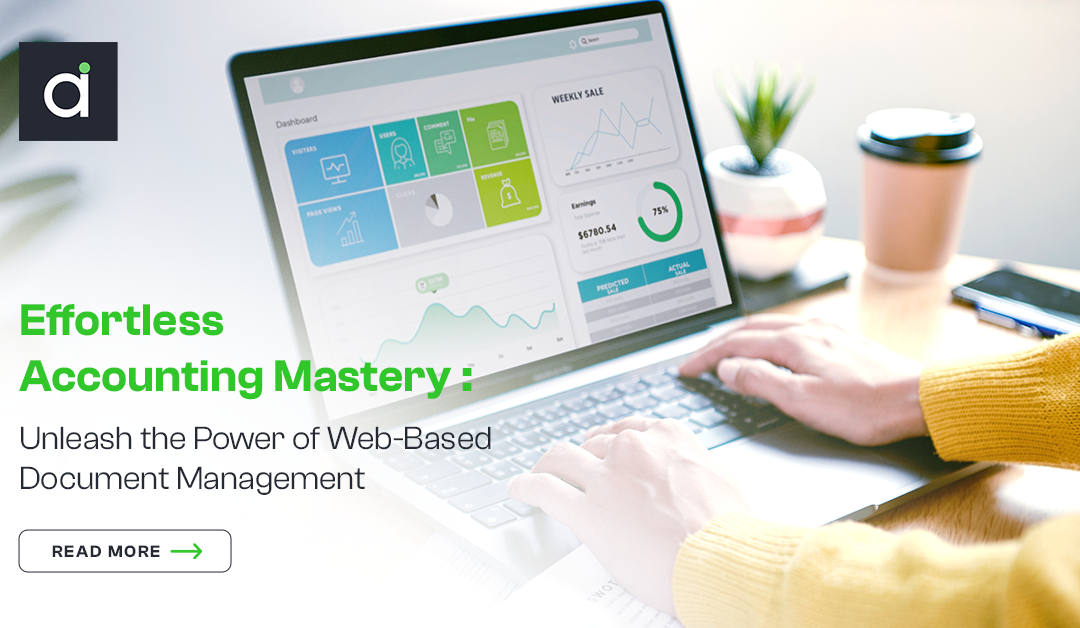Documents form the bedrock of accounting processes. They serve as a record of transactions and provide necessary information for creating and verifying financial statements.
Though manually filing, storing, locating, and managing paper-based documents is extremely challenging and leads to lower productivity. Moreover, it requires significant time and effort, with nearly 79% of accountants noting that they spend too much time finding files internally.
If you’re one of them or your employees are facing similar challenges, it’s time to adopt a web-based document management system to streamline your accounting processes.
What is a web-based document management system?
A web-based document management system makes storing, accessing, sharing, and managing your digital financial documents easier.
Such document management systems offer a centralized document repository and automatically sort your documents according to their type, such as receipts, invoices, bills, and other financial documents, simplifying the lives of business owners and bookkeepers.
Besides efficient document management, adopting such systems will also allow entrepreneurs and bookkeepers to streamline their accounting processes. Wondering how? Let’s find out.
4 Ways a web-based document management system can streamline accounting processes
A few key ways a web-based document management system will help business owners and bookkeepers streamline their workflows are as follows:
1. A centralized data repository improves operational efficiency
The biggest draw of such document management systems is that they offer a centralized data repository. With a centralized repository, bookkeepers and entrepreneurs won’t have to painstakingly file every document manually, worry about scattered digital records, or spend precious time locating documents.
A centralized repository facilitates the storage, retrieval, sorting, and sharing of all digital documents in a single place, saving time and effort. Moreover, all your financial documents will be automatically categorized by their type, further simplifying the process of locating the required documents and improving operational efficiency.
Additionally, such systems backup your data and even allow document recovery to minimize the instances of lost or misplaced documents.
2. Makes auditing a breeze and helps comply with the federal laws
A document management system helps maintain financial data records, setting you up for a seamless reporting and auditing process. For instance, it’ll assist you in complying with government regulations, such as the Sarbanes–Oxley Act of 2002, which mandates the maintenance of financial records for independent audits.
Since a robust document management system will automatically organize and store your documents per federal regulations, there’ll be no room for human error, eliminating all legal consequences.
Besides protecting your business from hefty fines and tax penalties, complying with federal laws will boost its public image and goodwill in the market.
3. Secures your documents and facilitates access management
Paper-based documents aren’t just difficult to manage. They also offer little in terms of security, meaning that sensitive documents can be easily accessed by just about anyone.
This makes a document management system invaluable since you won’t have to worry about your sensitive documents falling into the wrong hands. The software will help you secure your digital documents through an email and password so that only trusted individuals can access the stored documents, giving you more control over your data.
It’ll also give you an overview of who viewed or altered your documents in real-time. This will improve workflows as your employees can only access the data they need and won’t have to sort through huge piles.
4. Automate data entry and integrate with other accounting software
You don’t have to enter the financial data into the system manually. The web-based document management system will do it for you. All you’ve to do is scan or snap a photo of a paper-based financial document and email a dedicated virtual accountant.
The virtual accountant will extract data from your document automatically, helping you focus on more important matters than spending time on manual data entry. The process remains the same even if you’ve got a digital document. Just email it to your dedicated virtual accountant and let it handle your data entry task.
Moreover, you can easily export your financial data to other accounting software, such as Xero and QuickBooks, with the click of a button to seamlessly manage your accounting activities. This will offer you more flexibility and improve workflows.
Simplify accounting processes with a document management system
A web-based document management system like ASSIST will effectively manage your financial data so you don’t have to file, store, or locate documents manually. Additionally, time-consuming data entry will be a thing of the past.
This user-friendly software also promotes extracting data from your captured documents to streamline your reporting and accounting processes. Moreover, it secures your documents and lets you only share sensitive information with authorized individuals. So what are you waiting for? Try ASSIST today!



Recent Comments